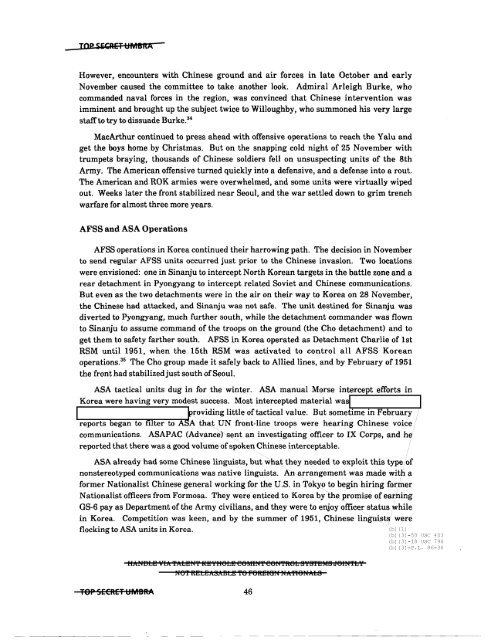American Cryptology during the Cold War - The Black Vault
American Cryptology during the Cold War - The Black Vault
American Cryptology during the Cold War - The Black Vault
Create successful ePaper yourself
Turn your PDF publications into a flip-book with our unique Google optimized e-Paper software.
op SECRET l::JMBRA<br />
However, encounters with Chinese ground and air forces in late October and early<br />
November caused <strong>the</strong> committee to take ano<strong>the</strong>r look. Admiral Arleigh Burke, who<br />
commanded naval forces in <strong>the</strong> region, was convinced that Chinese intervention was<br />
imminent and brought up <strong>the</strong> subject twice to Willoughby, who summoned his very large<br />
staffto try to dissuade Burke. 34<br />
MacArthur continued to press ahead with offensive operations to reach <strong>the</strong> Yalu and<br />
get <strong>the</strong> boys home by Christmas. But on <strong>the</strong> snapping cold night of 25 November with<br />
trumpets braying, thousands of Chinese soldiers fell on unsuspecting units of <strong>the</strong> 8th<br />
Army. <strong>The</strong> <strong>American</strong> offensive turned quickly into a defensive, and a defense into a rout.<br />
<strong>The</strong> <strong>American</strong> and ROK armies were overwhelmed, and some units were virtually wiped<br />
out. Weeks later <strong>the</strong> front stabilized near Seoul, and <strong>the</strong> war settled down to grim trench<br />
warfare for almost three more years.<br />
AFSS and ASA Operations<br />
AFSS operations in Korea continued <strong>the</strong>ir harrowing path. <strong>The</strong> decision in November<br />
to send regular AFSS units occurred just prior to <strong>the</strong> Chinese invasion. Two locations<br />
were envisioned: one in Sinanju to intercept North Korean targets in <strong>the</strong> battle zone and a<br />
rear detachment in Pyongyang to intercept related Soviet and Chinese communications.<br />
But even as <strong>the</strong> two detachments were in <strong>the</strong> air on <strong>the</strong>ir way to Korea on 28 November,<br />
<strong>the</strong> Chinese had attacked, and Sinanju was not safe. <strong>The</strong> unit destined for Sinanju was<br />
diverted to Pyongyang, much fur<strong>the</strong>r south, while <strong>the</strong> detachment commander was flown<br />
to Sinanju to assume command of <strong>the</strong> troops on <strong>the</strong> ground (<strong>the</strong> Cho detachment) and to<br />
get <strong>the</strong>m to safety far<strong>the</strong>r south. AFSS in Korea operated as Detachment Charlie of 1st<br />
RSM until 1951, when <strong>the</strong> 15th RSM was activated to control all AFSS Korean<br />
operations. 35 <strong>The</strong> Cho group made it safely back to Allied lines, and by February of 1951<br />
<strong>the</strong> front had stabilizedjust south ofSeouI.<br />
ASA tactical units dug in for <strong>the</strong> winter. ASA manual Morse intercept efforts in<br />
Korea were having very modest success. Most intercepted material wa~<br />
"'kI"~viding little of tactical value. But sometl.:-im-e-in"'--F=""eb"'r-u-a-r-y---'<br />
reports began to filter to ASA that UN front-line troops were hearing Chinese voice<br />
communications. ASAPAC (Advance)s~nt an investigating officer to IX Corps, and he<br />
reported that <strong>the</strong>re was a good volume ofspokell Chinese interceptable.<br />
I<br />
ASA already had some Chinese linguists, but wha~ <strong>the</strong>y needed to exploit this type/of<br />
nonstereotyped communications was native linguists. A:n~rrangement was made with a<br />
former Nationalist Chinese general working for <strong>the</strong> U.S. in Tokyo to begin hiring former<br />
Nationalist officers from Formosa. <strong>The</strong>y were enticed to Korea by <strong>the</strong> promise of earning<br />
GS-6 pay as Department of<strong>the</strong> Army civilians, and <strong>the</strong>y were to enjoy officer status while<br />
in Korea. Competition was keen, and by <strong>the</strong> summer of 1951, Chinese linguists were<br />
flockingtoASA units in Korea. Ib) (1)<br />
Ib) (3) -50 USC 403<br />
Ib) (3) -18 USC 798<br />
Ib) (3) -P.L. 86-36<br />
IIl!:f4'Bbl!J 'Ill!: 'fl!:bl!Jr,'f I[I!JYII6bl!J e6MIn'fe6r,'fft6b SYS'fI!JMS if6In'fbY<br />
r,6'f ftELI!JA8ABLI!J 'f6 F6ftt1lffl, f4'l!:fi6NcAbB<br />
Tep SECRET l::JMBItA 46<br />
- _. - - -----------------
















